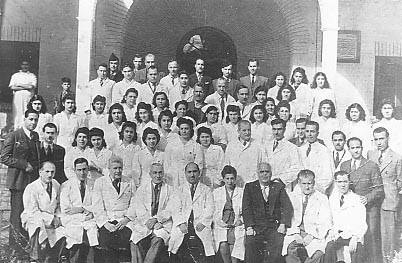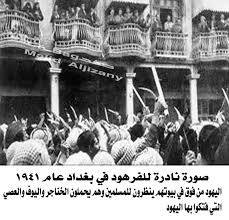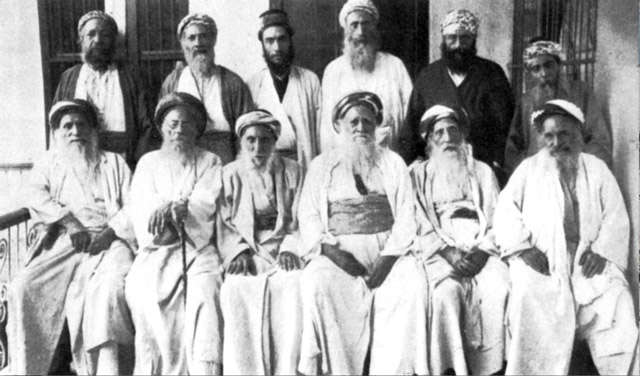On June 1, 2015 International Farhud Day will be proclaimed at a live globally streamed side event at the United Nations featuring a keynote lecture by author
Edwin Black entitled "The Farhud and the Creation of 850,00 Post-War Refugees From Arab Lands".
The Jews were an integral part of Iraqi society, who dated their heritage back to the destruction of the First Temple in 586 BCE. The security and confidence of Iraqi Jews was shattered by the pro-German military coup of April 1941. While the coup leaders were quickly defeated by British forces, their departure was followed by a large-scale farhud or pogrom against the Jews of Baghdad.
 Doctors and nurses at Meir Elias Hospital, 1930s. The Meir Elias Hospital in Baghdad, the largest and most modern in Iraq, which served Jews and non-Jews alike, was ravaged by an anti-British mob on May 6, 1941.
Doctors and nurses at Meir Elias Hospital, 1930s. The Meir Elias Hospital in Baghdad, the largest and most modern in Iraq, which served Jews and non-Jews alike, was ravaged by an anti-British mob on May 6, 1941.
(Copyright: JIMENA-Jews Indigenous to the Middle East and North Africa)
On June 1, 1941, celebrating the Shavuot holiday, a
group of Baghdad Jews ventured out for the first time in weeks to greet
the returning pro-British Regent. They thought stability had finally
returned to their lives, only to be ambushed by an armed Arab mob. The
rioting went on for two days. While the exact figure is not known, it is
estimated that at least 180 Jews were killed in Baghdad and Basra,
perhaps as many as 600, and hundreds more were wounded. Jewish women
were gang raped and mutilated. Jewish shops and homes were looted and
then torched. A synagogue was invaded and its Torahs burned. Afraid to
give the dead a proper burial, the corpses were buried in a large mass
grave.

Rioters taking to the streets during the Farhud in Baghdad, Iraq, June 1-2, 1941 (Publised on the JIMENA Facebook page)
As Edwin Black wrote: "Farhud - in Arabic, the word means violent dispossession. It was a word the Jews of wartime Europe never knew. Holocaust- it was a word the Jews of wartime Iraq never knew. But soon they would all know their meaning regardless of the language they spoke. After the events of June 1-2, 1941, both words came together."
 Rabbinical scholars of Baghdad, Iraq in 1910
Rabbinical scholars of Baghdad, Iraq in 1910
Copyright: JIMENA
The Farhud marked an irrevocable break between Jews and
Arabs in Iraq and paved the way for the dissolution of the
2,600-year-old Jewish community 10 years later. Despite their deep
roots, the Jews understood that they would never be an integral part of
an independent Iraq. Forced out by fear of a second Farhud and
denationalizing legislation that made them stateless refugees, 90 per
cent of Iraq's Jewish community immigrated to Israel after 1948.